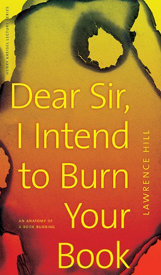| ________________
CM . . .
. Volume XX Number 1. . . .September 6, 2013 
 |
Dear Sir, I Intend to Burn Your Book: An Anatomy of a Book Burning.
Lawrence Hill.
Edmonton, AB: Canadian Literature Centre/The University of Alberta Press, 2013.
33 pp., pbk. & E-Editions, $10.95 (pbk.), $8.95 (EPUB & Amazon Kindle).
ISBN 978-088864-679-8 (pbk.), ISBN 978-088864-708-5 (EPUB), ISBN 978-088864-709-2 (Kindle).
Subject Headings:
Censorship.
Books and reading-Political aspects.
Intellectual freedom.
Freedom of expression.
Professional.
Review by Lian Beveridge.
*** /4
|
| |
|

excerpt:
There is something particularly odious about burning a book, or a pile of books. The action aims not just to remove the offending article from the hands of readers, but to silence and intimidate writers, publishers and booksellers.
Lawrence Hill’s approachable and thought-provoking book takes censorship as its main topic. Its inspiration was an incident in which the cover of Hill’s novel The Book of Negroes was burnt in protest by Dutch “descendants of enslaved in the former Dutch colony Suriname” (3). The text is a transcript of Hill’s speech for the Henry Kreisel Lecture Series at the Canadian Literature Centre in the University of Alberta. Hill takes the original incident as a starting point to discuss large topics of power, communication and conflict.
The overarching message of the text is that censorship and racism are complex issues which require further discussion. I particularly enjoyed Hill’s exploration of his identification with the people who burned his book. He says, “I suspect that on nine issues out of ten with respect to the history and current situation of peoples of the African Diaspora, we are on the same page” (31). He also identifies that they, “in the broader Diaspora of African peoples, [. . . ] are my own people” (11). He nonetheless deplores their actions, primarily because censorship silences discussion. This thoughtful teasing out of identification complements Hill’s argument about the complexity of censorship and the need for dialogue. The text ends with the clear message that “Literature should get us talking – even when we disagree” (31).
This book is most directly relevant to children’s literature in its discussion of the censorship of books for children. Hill writes that “half the world, it seems, wants to pull one book or another off school shelves, because the children just aren’t ready for it” (14). He makes the important observation that “the hypocrisy of saying ‘I can read this and handle it but others must be protected from it’ applies to children too” (17). Hill illustrates his point about children’s literature with a story about his then 10-year-old daughter resisting the censorship of Deborah Ellis’ Three Wishes: Palestinian and Israeli Children Speak (19-20). This story illuminates the contradictions in the way we censor. Adults censor on behalf of children, but do not ask children if they need or want this “protection”. It also illuminates the contradiction between the way we conceptualise and idealise childhood, and the realities of many children’s lives. As Josh Westbrook put it: “Kids are living stories every day that we wouldn't let them read.” Hill makes the admirable suggestion that we “teach young people to be aware and to be critical thinkers” (15).
This text raises lots of complicated and important issues. Unfortunately, this 32 page text doesn’t have room to elaborate on these issues. I can imagine this piece would have been an inspiring and powerful lecture, but it has lost something in its translation to the page. I’m unclear who the intended audience is for this publication. In its breadth of topics, it would be an excellent text for those just beginning to think about censorship, but the complexity of the language is better suited to teenagers and adults. It would make a useful addition to a small collection of texts on censorship, particularly if a librarian has the opportunity to guide readers to it, but I fear it would be lost in a large collection.
Recommended.
Lian Beveridge is a PhD graduate from the University of British Columbia. Her primary research interests are children’s literature and queer theory.

To comment
on this title or this review, send mail to cm@umanitoba.ca.
Copyright © the Manitoba Library Association. Reproduction for personal
use is permitted only if this copyright notice is maintained. Any
other reproduction is prohibited without permission.
NEXT REVIEW |
TABLE OF CONTENTS FOR THIS ISSUE
- September 6, 2013.
AUTHORS |
TITLES |
MEDIA REVIEWS |
PROFILES |
BACK ISSUES |
SEARCH |
CMARCHIVE |
HOME |
